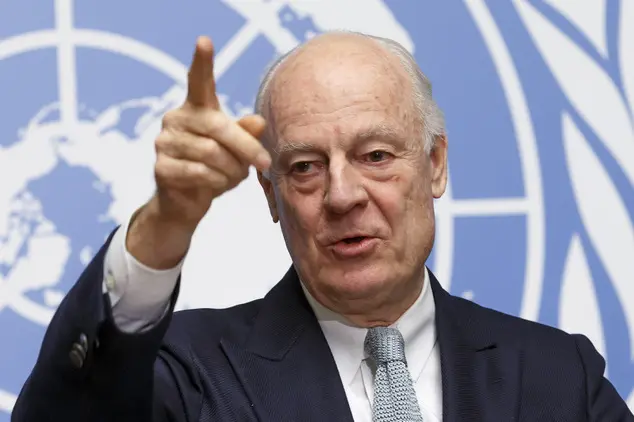A delegation from Syria's main opposition group is now here in Geneva to join a major international efforts to broke peace talks for the country, but the uncertainty of the just-started UN-mediated intra-Syrian talks still remain.
The opposition spokesperson Salem el-Meslet told reporters Sunday in a Geneva hotel that if they don't see the necessary good will from the government side, they will not go into talks and will leave Geneva.
He said the opposition will discuss with UN Special Envoy for Syria Staffan de Mistura their preconditions, including lifting the sieges, stopping the shelling and releasing detainees.
"If we see an implementation of these demands, including allowing trucks of aid into besieged areas, we will consider this as a sign of good will," he noted.
A source close to the opposition delegation said that on Sunday afternoon they have met the UN Special Envoy "informally" and are now still waiting for further meeting with the UN representative.
The delegation from the Syrian opposition High Negotiation Committee (HNC), a group of 17 members, arrived at Geneva on Saturday evening.
A HNC spokesperson said that the HNC head, Dr. Riyad Hijab, plans to arrive at Geneva on Sunday.
On Friday, the HNC decided to participate in the talks after receiving alleged assurances from the United Nations and the United States, despite its announcement to boycott the talks which the United Nations had refused to postpone for a second time.
The United Nations Special Envoy for Syria met the Syrian government delegation on Friday, thus kicking off United Nations-brokered peace talks to end the country's five-year-old war.
UN-brokered meetings are to take place over the next six months in view of finding lasting peace for Syria, a country at war since 2011.
Scheduled talks come against a backdrop of stalemates as initiatives failed to make headway in solving the political crisis which has gravely affected the country's people.
Estimates reveal that 250,000 Syrian people have died in the five years since the war started and that more than 4 million people have fled the Middle Eastern country as a result of protracted violence.
An additional 6.5 million have been internally displaced by conflict and 13.5 million people inside the country are in urgent need of humanitarian aid.
Two previous rounds of talks fell short of making divergent factions settle on a lasting agreement to bring peace to the country whose war is pitching Syrian president Bashar al-Assad against anti-government forces, with terrorist factions such as the Islamic State(IS) and Al-Nusra also in the mix.
One conscientious issue which has delayed efforts has been who to invite to talks, which not only aim to discuss governance, constitutional change and the holding of elections, but also address the implementation of a lasting ceasefire to facilitate the delivery of humanitarian aid and the possibility of stopping the threat of IS. Enditem
 简体中文
简体中文

